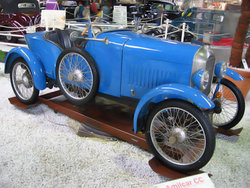Amilcar CC

| |
| Amilcar CC | |
|---|---|
| Flag | |
| Type | Torpedo |
| Manufacturer | Amilcar |
| Production year | 1922 |
| Final Production | 1925 |
| Family | Amilcar CS Amilcar C4 |
| Length | 3300mm |
| Width | 1300mm |
| Height | |
| Step | 2320 |
| Weight | 350kg |
| Ancestor | |
| Next model | Amilcar CGS |
| competitors | Renault NN Mathis Type S and SB Citroën Type C |
The 'CC' was a small car produced from 1922 to 1925 by Amilcar.
History and Profile
The CC was the first car proposed by the House of Saint-Denis. Vehicle was a small, very light and therefore classifiable as autociclo. At the autocicli enjoyed substantial tax relief and CC could thus win right away a place in the heart of the public.
The CC was a small torpedo in two places, setting sportiveggiante, so that right from the start was used successfully in various competitions. In reality the task of Amilcar was not easy, because the competition was fierce, being made up of cars like the Peugeot Quadrilette, Renault NN and Citroën Type C.
His sporting successes, however, allowed the small Amilcar can be further appreciated by the public. Even today is a classic among vetturette sportiveggianti at the time.
The CC was equipped with a engine to 4 cylinders in line cooled water from 903 cc. The distribution was a side valves. The power was entrusted to a carburetor Solex. The power maximum was 17 HP at 3000 rpm.
The tension was rear, exchange to 3 marches.
The CC reached a maximum speed of 80 km / h, a good figure for the era, made possible by the lightness of body car.
The frame included a braking system rather elementary, consists only of drums to the rear.
The CC was produced until 1925, but already in 1923 was introduced its natural evolution, the CGS, which through subsequent developments will take the place of CC.
External links
| 1921 - 1939: CC | C4 | Type E | Type L | Type G | CG | CGS | CS | C6 | 5CV | Serie M | C8 | Pégase | Compound |